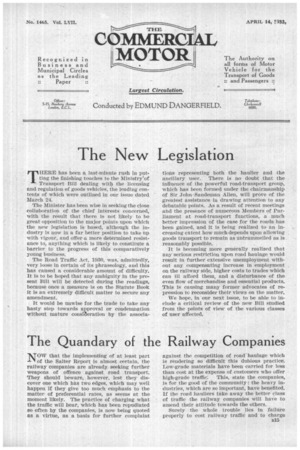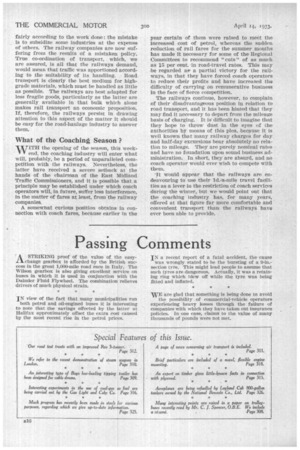The Quandary of the Railway Companies
Page 29

Page 30

If you've noticed an error in this article please click here to report it so we can fix it.
'VOW that the implementing of at least part -4-1 of the Salter Report is almost certain, the railway cOmpanies are already seeking further weapons of offence against road transport. They . should beware, however, lest they discover one which has two edges, which may well happen if they give too much emphasis to the matter of preferential rates, as seems at the moment likely. The practice of charging what the traffic will bear, which has been repudiated so often by the companies, is now being quoted as a virtue, as a basis for further complaint against the competition of road. haulage which is rendering so difficult this dubious practice: Low-grade materials have been carried for less than cost at the expense of customers who offer high-grade traffic This, state the companies, is for the good of the community : the heavy industries, which are so important, have benefited. if the road hauliers take away the better class of traffic the railway companies will have to amend their attitude towards the others, Surely the whole trouble lies in failure properly to cost railway traffic and to charge B15 fairly according to the work done : the mistake is to subsidize some industries at the expense of others. The railway companies are now suffering from tile results of a mistaken policy. True co-ordination of transport, which, we are assured, is all that the railways demand, would mean that traffic was apportioned according to the suitability of its handling. Road transport is clearly the best medium for highgrade materials, which must be handled as little as possible. The railways are best adapted for less fragile goods, particularly as the latter are generally available in that bulk which alone makes rail transport an economic proposition. If, therefore, the railways persist in drawing attention to this a§pect of the matter it should be easy for the road-haulage industry to answer them.
What of the Coaching Season ?
WITH the opening of the season, this weekend, the coaching industry will enter what will, probably, be a period of unparalleled competition with the railways. Nevertheless, the latter have received a severe setback at the hands of the chairman of the East Midland Traffic Commissioners, and it is possible that a principle may be established under which coach operators will, in future, suffer less interference, in the matter of fares at least, from the railway companies.
A somewhat curious position obtains in connection with coach fares, because earlier in the year certain of them were raised to meet the Increased cost of petrol, whereas the sudden reduction of rail fares for the summer .months has made it necessary for some of the Regional Committees to recommend "cuts" of as much as 15 per cent. in road-travel. rates. This may be regarded asa partial victory for the railways, in that they have forced coach operators to reduce their profits and have increased the difficulty of carrying on remunerative business in the face of fierce competition.
The railways continue, however, to complain of their disadvantageous position in relation to road transport, and it has been hinted that they may find it necessary to depart from the mileage basis of charging. It is difficult to imagine that they hope to throw dust in the eyes of the authorities by means of this plea, because it is well known that many railway charges for day and half-day excursions bear absolutely no relation to mileage. They are purely nominal rates and have no foundation upon sound business administration. ,In short, they are absurd, and no coach operator would ever wish to compete With them.
It would appear that the railways are endeavouring to use their id.=a-mile travel facilities as a lever in the restriction of coach services during the winter, but we would point out that the coaching industry has, for many years, offered at that figure far more comfortable and convenient transport than the railways have ever been able to provide.




























































































